[Update, 10:50am: According to a comment from Karl Rohde of the BTA, the work session has been delayed for a few weeks.]
The House Transportation Committee has scheduled a work session for the Idaho Stop law proposal (HB 2690).
The work session will take place this Wednesday (3/25) and the BTA’s government affairs director and lobbyist Karl Rohde says it’s very likely a vote will also take place.
I spoke with Rohde about the news this morning. Just yesterday, he expressed major concerns that biased and inaccurate media coverage of the bill was jeopardizing its chances.
Rohde said that scheduling a work session means that committee Chair Terry Beyer feels strongly enough about the bill that she’s willing to discuss it further. Work sessions are closed to public testimony but Rohde will be on hand to answer any questions that might arise from committee members.
“It’s going to be extremely important for folks to contact committee members… they especially need to hear from constituents in their specific districts.”
— Karl Rohde, BTA
Sensing the urgency of what this work session could mean to the fate of his bill, Rohde said he plans to send out a press release and action alert to members encouraging them to contact their state representatives. “It’s going to be extremely important for folks to contact committee members… they especially need to hear from constituents in their specific districts.”
Rohde stressed that anyone who contacts a committee member should be respectful; “Even if they have a different viewpoint, they have right to that opinion… you’re simply sharing your feelings with them.”
Now, let’s take a look at the ten members of the House Transportation Committee and try to guess how they might vote.
Four members of the current committee were in the House when the Idaho Stop law first came up in the state legislature in 2003. They all voted yes (the bill passed the house by a margin of 47-9 but then failed in the Senate).
Here’s a breakdown of current committee members and how I think they might vote:
Chair, Rep. Terry Beyer (D-Springfield)
She voted in favor of Idaho Stops in 2003. During the hearing this week she seemed to have a good grasp on why supporters want the bill. Her advice to Rohde was to work on the PR battle. She is a likely yes vote on Wednesday.
Vice-Chair, Rep. Nick Kahl (D-Portland):
Kahl is a definite yes. His comments during the hearing were very much in support of the bill.
Rep. Jules Bailey (D-Portland)
This is Bailey’s bill. He will vote yes.
Rep. Cliff Bentz (R-Ontario)
Bentz was skeptical during the hearing. He’s the one who asked Rohde why bikes should be treated differently than electric cars (since we want to promote those too). Bentz’s predecessor from Ontario (a Democrat), was one of just nine who voted against the bill in 2003. I think Bentz is an unknown but is trending toward a no vote.
Rep. Michael Schaufler (D-Happy Valley)
Schaufler is a co-sponsor of the mandatory bike registration bill, but sources say he’s actually supportive of biking. The only comments he made during the hearing earlier this week were good-natured jokes about how much flack he’s received over the registration bill. Rohde has told me Schaufler loves bikes. He is also one of the House members who voted yes in 2003. I say he’ll vote in support this time around.
Rep. Deborah Boone (D-Cannon Beach)
During this week’s hearing, Boone asked Rohde why he doesn’t just work with Portland Police on this issue. Rohde’s response was that it would be even more confusing if there were different laws in different cities. I have no idea how she’ll vote.
Rep. George Gilman (R-Medford)
Gilman was completely silent during the hearing this week. He voted yes on the bill in 2003, but sources say he is on the fence this time around.
Rep. Vickie Berger (D-Salem)
In the hearing, Berger expressed major concerns that the bill would only cause confusion and she wondered why we need a “whole new set of rules”. However, it seems her concerns can be easily answered and countered by a more in-depth discussion that is likely to happen at the work session. I say she’s on the fence but trending toward a yes.
Rep. David Edwards (D-Hillsboro)
Edwards also brought up concerns about the “uncertainty” he feels this law would cause. I see him similar to Berger; not outright opposed, but perhaps open to being educated about how the law would work. One the fence, trending toward a yes.
Rep. Jim Weidner (R-Yamhill)
Weidner voiced strong opposition to the bill during the hearing. Not only did he have the most pointed criticisms, but he seemed to be smirking whenever Rohde was answering a tough question. I would be shocked if Weidner voted anything but no.
So, given my amateur analysis above; I see four likely yes, one definite no, two on the fence but trending yes, one on the fence trending no, one squarely on the fence, and one unknown. Six votes are needed to get this bill onto the House floor.
It all adds up to a few tense days for Rohde, who admitted this morning that, “I have my work cut out for me.”
Stay tuned.
— Browse our Idaho Stop Law tag for more coverage of this issue.



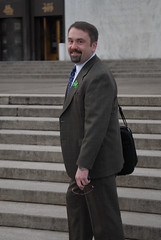
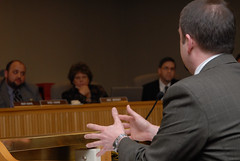
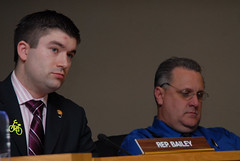
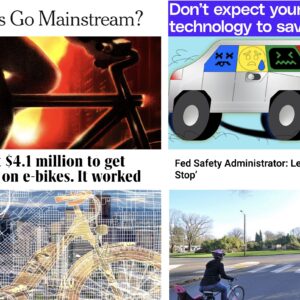
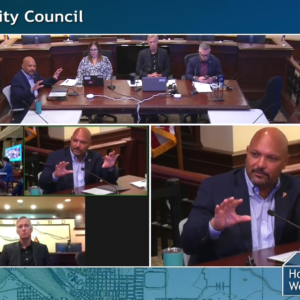
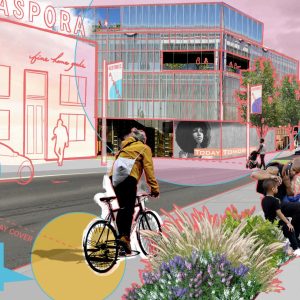

Thanks for reading.
BikePortland has served this community with independent community journalism since 2005. We rely on subscriptions from readers like you to survive. Your financial support is vital in keeping this valuable resource alive and well.
Please subscribe today to strengthen and expand our work.
I just spoke with Rep. Baily’s Legislative Aid and it looks like the work session is going to be put off a couple weeks in order to allow us more time to spread the word and explore some possible amendments that would increase support. My blood pressure has gone down a few points, but we still have a lot of work to do.
thanks for the update Karl… i’ll update the story right away. hope someone still finds this story useful ;-).
Well, it still gives us contact information so we can write our reps and let them know we want this to pass when it does come up for a vote.
Thanks Karl, Jonathan and Rep. Baily for the work on this law. Please be sure there is $ allocated for education in this bill. I wish we could see a requirement for drivers to take a written law test on a regular basis, since laws change. It would be great for the BTA to produce a card with laws for bikes, so that cyclists could pass these out to auto drivers to have them better understand the differences that currently exist in laws for bikes and laws for cars.
Just an idea.
Karl, consider some of the PR ideas I threw out here:
http://bikeportland.org/2009/03/19/bta-negative-media-has-put-idaho-stop-effort-in-jeapordy/#comment-1178866
As a side note, I find it funny that the argument keeps coming up (from those in rural areas mainly) that “this might work in rural areas, but it would be dangerous in an urban setting” – yet it’s the reps from urban areas that are most strongly in support of it, and those from rural areas that are most strongly against it. Double-talk much?
I think a lot of the confusion of the Idaho stop bill surrounds what exactly it means to yield and when. Motorists don’t often see yield signs and when they do they are almost always meaningless, such as at highway on-ramps.
I made a flow-chart that captures the spirit of the Idaho-stop.
http://www.portlandsagwagon.com/Site/Blog/Entries/2009/3/6_Idaho-stop_PSA_revised.html
Idaho-stops are not complicated. This bill merely codifies typical cyclist behavior so that otherwise safe and conscientious riders are no longer subject to police sting operations. “Blowing through” stop signs is still illegal, rolling through when no cars are around is being made legal.
I’ve called my state rep and encourage everyone to do the same. It really does make a difference. Thanks.
As always, the battle is for the swing votes. It’s likely that they are hesitating because they aren’t sure about what the actual effect of the change would be… including concerns about confusing road users.
One of the best positive messages to reinforce is the experience in Idaho. Idaho drivers and cyclists and cops have had this law on the books for almost 30 years. So tell the Oregon legislators they are voting something tried-and-true. There’s plenty of experience demonstrating that it has benefits… and that the Idaho experience shows they don’t need to be worried about creating confusion or other problems.
The more they see this change as more of a minor housekeeping issue (simply recognizing safe behavior that occurs daily throughout the state already), the more comfortable they can be with voting yes.
Also, there was a good letter in this morning’s Oregonian that calmly corrected some of the myths and misunderstandings in yesterday’s story. Showering the newspapers with similar calm and respectful and positive letters will help legislators get the sense that there is support out there and they aren’t risking looking bad to the voters.
Idaho drivers (and kids) have managed to thrive for 27 years with this law on the books… Oregon drivers (and our kids) should be able to manage just as well.
When calling state representatives, what formal name should we use to refer to this bill? What is it’s actual name and number?
(I know I could probably read the coverage and find out myself, but seemed easier to ask here.)
I just called my Senator (Carter) and Rep (Shields). The very nice woman at Shield’s office said she had gotten three calls in support of the bill since yesterday.
Time to get on the phone people, it takes literally 30-60 seconds.
Dave #6
It looks like those urban reps are only doing what benifits them politically
How are they going to enforce the “blowing through” vs “rolling through”? It sounds like there may be some controversy when it Is cyclist oppinion vs police opinion if he was going too fast. More to write about in future blogs
Post 4:
Tacking on education $ to the bill would make it harder to pass and would also necessitate it going through the means and ways committee, a bad idea since they have to cut tons of working programs from DHS, early childhood education, and Parks and Rec.
Well, my point was more that representatives from rural areas are making assumptions about areas they don’t live and work, but also saying it would work in the areas they are from, yet they strongly oppose it. If they feel it would work in rural areas (and they actually believed that), and the reps from urban areas feel it would work in urban areas, shouldn’t they be supportive of it?
Why should safe drivers be subject to stings? How many times a year do drivers get pulled over an fined for going an incremental amount over the speed limit? This whole thing seems like a red herring. Either change law enforcement’s attitude and ability as a whole towards revenue based ticketing or be prepared to pay the fine like every other vehicle on the road.
I think what they should do is to keep the law as it is, bikes need to follow the same rules especially downtown. However I would recomend lowering the fine to a mere slap on the wrist vs a huge fine. In a quite rural area even now the police don’t enforce the stop rules as long as they are following the “basic rule” which dosn’t put anyone in danger. If you don’t show “attitude” when you do get pulled over you will do much better, no tazers…. That is with the exception of stings like going down Broadway towards the bridge in the mornings… then its a roll of the dice.
Practical definition of “slows the bicycle to a safe speed”: slow enough that the cyclist can stop their vehicle such as not to cause any injury or damage to a pedestrian suddenly entering the crosswalk that the cyclist will traverse.
Ultimately, pedestrian interest groups should be the most afraid of this bill. They have superior right of way in the crosswalk but cyclists will be looking mainly for autos.
Maybe we can sell the detractors on the fact that the behavior they think this bill supports, scoff-law cycling, is in fact fined more. The behavior that this allows will in most circumstances not be seen because it will occur where there is no traffic at that time. They try to tell me that if I am the last person left on earth I still need to stop at a stop sign.
“Why should safe drivers be subject to stings?”
Typically if you are pulled over on a certain street for speeding… you will Never speed on that street again
@jim: leaving the law the way it is and reducing the penalty to a slap on the wrist will essentially result in the same behavior that this law would allow legally, so I don’t see why you are so opposed to the law?
I know some of you have no interest in driving a car, however there are a lot of teenagers out there that will be behind the wheel some day. What is their automatic response going to be when they come to a stop sign? it will be to roll on through. This is teaching bad behaviour to our children that is not acceptable.
Understand I do hear your ply and feal your frustration and impatience to get on down the road. this is much like a jaywalking law, I do it all the time, It is a risk I take, someday I may get a citation. However if there were no laws there would be chaos
also as a driver you won’t believe how frustrating it is dealing with bikes cutting in and out of traffic in situations uncomfortable for the driver, I think this would compound the situation
Hey, West Cougar:
You might add to your flow chart between “Approach stop sign” and “Is another vehicle present” the phrase “slow down”.
One of the problems with this bill is that it is perceived as letting cyclists maintain their speed through intersections, which is not true.
Typically if you are pulled over on a certain street for speeding… you will Never speed on that street again
Why does this logic not apply to cyclists who get fined for rolling through stop signs?
You might add to your flow chart… “slow down”
Slow down is vague and becomes a point of confusion… how much slower is enough?
Ultimately how much, if any, is unimportant. If the cyclist can determine whether there are other vehicles present, which is to say he realizes he needs to stop, he is going slow enough. If he can’t determine that, which is to say he didn’t stop when other cars were present, then, by definition, he’s blown the stop.
This distinction is important to maintain because it addresses the case of a motorcycle cop running a sting by hiding a half block away from the stop. He can’t use his subjective judgement to say the cyclist blew the stop sign when in fact there were no cars actually at or approaching the stop sign. It requires the presence of another car to induce a cyclist to stop. And that is how matters should be: if there is another car, I don’t care how fast or slow the cyclist is going, he should stop.
@jim: I am a driver, and I don’t think this law would bother me at all, either on a bike or in a car. I would agree with perspective shared earlier in the discussion of this law from both perspectives (bike and car), that it’s usually not a problem for people figuring out when to stop, it’s more of a problem figuring out who gets to go first after everyone is stopped – for some reason *that* seems to be a very complicated decision sometimes, even when it’s clear who got to the stop first.
Given all the howling here when someone riding a bike gets a ticket for running a stop sign, where there is little dispute about the actual fact that they broke the law, it ought to be a whole lot more fun if this passes and then people start getting tickets for not yielding. Somehow I doubt the officers writing the tickets are going to be using a flow chart posted on bikeportland.
How many kids would they have to peel out from under buses before they would overturn this thing. I would hate to see any kind of increase in fatalities
jim (#28): “How many kids would they have to peel out from under buses before they would overturn this thing”
Probably the same number they’ve had to in Idaho over the past 27 years.
I agree with q`Ztal (#17), in the sense that it’s my experience as a pedestrian (and I’ve been a pedestrian for far longer than I’ve been a cyclist) that gives me pause about this bill. I think that, more often than not, cyclists don’t defer to pedestrians as they should, and this bill is very likely to make that situation worse. I don’t think the concerns of motorists are particularly justifiable, given the Idaho experience, but I would be happier with a simple reduction in cyclist fines for not stopping at stop signs when that behavior isn’t putting anyone at risk. This bill risks encouraging bad behavior that, instead, should be discouraged, and the payoff is pretty insignificant cyclists. As I said before, whether this bill passes or fails won’t change how I ride a bit, so I remain ambivalent about it.
Right Turn On Red
Let’s get into the wayback machine and ask some questions about RTOR before it gets written into the vehicle code…
How would cops know if someone made an unsafe, illegal RTOR?
Won’t RTOR put pedestrians and cyclists at increased risk of being run over?
Can we really leave other people’s safety up to some driver’s interpretation of when it is safe to disobey a traffic signal?
What if a driver can see (or thinks he can see) that an intersection is clear before he gets there–will he really stop before turning on red?
Won’t drivers in the green-light direction be confused about whether a driver waiting to make a RTOR has some kind of mysterious right-of-way to pull out in front of them?
…And so forth
The only difference between the proposed law and RTOR is that it would, indeed, apply a different set of rules to one vehicle than are applied to others–but there are already different sets of rules. Ride to the right. Mandatory bike lane use. Riding in crosswalks or on sidewalks (at walking pace, outside the downtown zone), and other rules that by their very nature have no application to bikes.
Having an Idaho stop law or not will not likely affect me personally, but some of the ignorance and misunderstanding about what this law would do, the nature of bicycling and bicyclists is really starting to drive me insane. This debate is like a gory accident–I want to look away…yet..I..can’t…
How would cops know if someone made an unsafe, illegal RTOR?
Simple: if a car turns before coming to a complete stop, it’s illegal. If a ROTR usurps somebody else’s right-of-way, it’s illegal.
Won’t RTOR put pedestrians and cyclists at increased risk of being run over?
Absolutely. It does.
Can we really leave other people’s safety up to some driver’s interpretation of when it is safe to disobey a traffic signal?</i?
Absolutely not.
What if a driver can see (or thinks he can see) that an intersection is clear before he gets there–will he really stop before turning on red?
Sometimes, a driver does not.
The upshot being … we shouldn’t allow ROTR. It’s dangerous. Civilized places that don’t stress the primacy of the automobile, like NYC, don’t allow ROTR. Portland shouldn’t allow it either, but here the car is king.
But I don’t really see that any of this has too much to do with the proposed Idaho stop law, since one deals with what motorists are allowed to do and the other with what cyclists are allowed to do. On one hand, you could make the case that it’s a bad idea for the similar reasons that ROTR is a bad idea; OTOH, you could argue that ROTR is a bad idea because it kills people, while it’s unlikely that the Idaho stop law would kill anybody.
Sorry, I neglected to close the italic tag. Oh how I wish BikePortland.org allowed one to PREVIEW comments before posting!
The old saying red light stop
green light go
yellow light go real fast
Thats how many drivers react to yellow lights they try to speed through them before they turn red. If your rolling out into the middle of an intersection where a driver is not expecting someone to be it could be a disasterous next couple of seconds. Children do not have the ability to judge how far a car can travel at different speeds in just seconds
By the way I heard on the radio that in one state they lengthened yellow lights by one second and reduced red light camera tickets by 80%
Michael–
My point is that we already have a law that allows vehicle operators to rely on their own judgment when it comes to the degree to which they obey or “disobey” a traffic control device–and people seem to be able to live with it. There is definitely not the level of outcry over RTOR that there is over potential Idaho stops. I just want to get people to think about why one law (Idaho stop) is considered to be so extremely “idiotic” and “unsafe” when the other (RTOR, which actually is unsafe) is considered to make perfect sense. I think the arguments are, as they usually are when it comes to debates over “bike issues” irrational and emotional.
jim–
“Thats how many drivers react to yellow lights they try to speed through them before they turn red. If your rolling out into the middle of an intersection where a driver is not expecting someone to be it could be a disasterous next couple of seconds.”
The proposed Idaho stop law has nothing to do with stop lights. It pertains only to stop signs, where everybody should be stopping (or practically stopping) anyway. At two-way stops, the obvious right-of-way rules continue to apply. Anybody speeding up to go through a stop sign would be subject to a citation for improper entry into an intersection.
Imagine this: you are making a left turn off of a main road onto a side street. There is no traffic light or stop sign in your direction. There may or may not be oncoming traffic. What do you do? If there is oncoming traffic to which you must yield, you stop and wait. If there is no oncoming traffic, you just go, no stopping. This is what people do when they have a clear view of the situation and they know who has the right-of-way.
Not true- it pertains to flashing red lights which is considered a stop light and can operate differently from different directions at different times. That would place a cyclist in an unsuspected place at a dangerous time. I still argue that children (and some adults) do not have the judgement if they can go through an intersection in front of a car that does have a right of way, they don’t comprehend all the factors. It is better if they come to a stop like the law is now. anything different is foolish
“it pertains to flashing red lights which is considered a stop light and can operate differently from different directions at different times.”
OK, but at flashing yellow lights, I would claim that drivers do not exhibit the same kind of behavior that they do at “normal” yellow lights. There is not the incentive at a flashing yellow to speed up and try to “beat” it. There is nothing to beat. Behavior at flashing lights is the same as at stop signs, whether they are two-way or all-way.
And kids don’t know from the law. They know from watching their parents. If you want your kids to be safe, model and teach them safe behavior, whatever form that might take.
Jim, your comments and style of argument are ultimately going to make the advocates of the Idaho stop bill stronger and smarter. Thanks for playing devil’s advocate and helping us work out well-reasoned responses to biased resistance worded in the finest tradition of truthiness.
Thanks for participating in this debate before it goes to the work session and then to a vote.